By Tunde Ogunmola
Local government is popularly referred to as grassroots government. It is commonly known as the closest government to the people. Viewed from this perspective, local government is a concrete reality to the people not an abstract entity that is detached from them. In view of this, it’s a government that should be able to feel, understand and respond to the needs and expectations of the people under its watch.
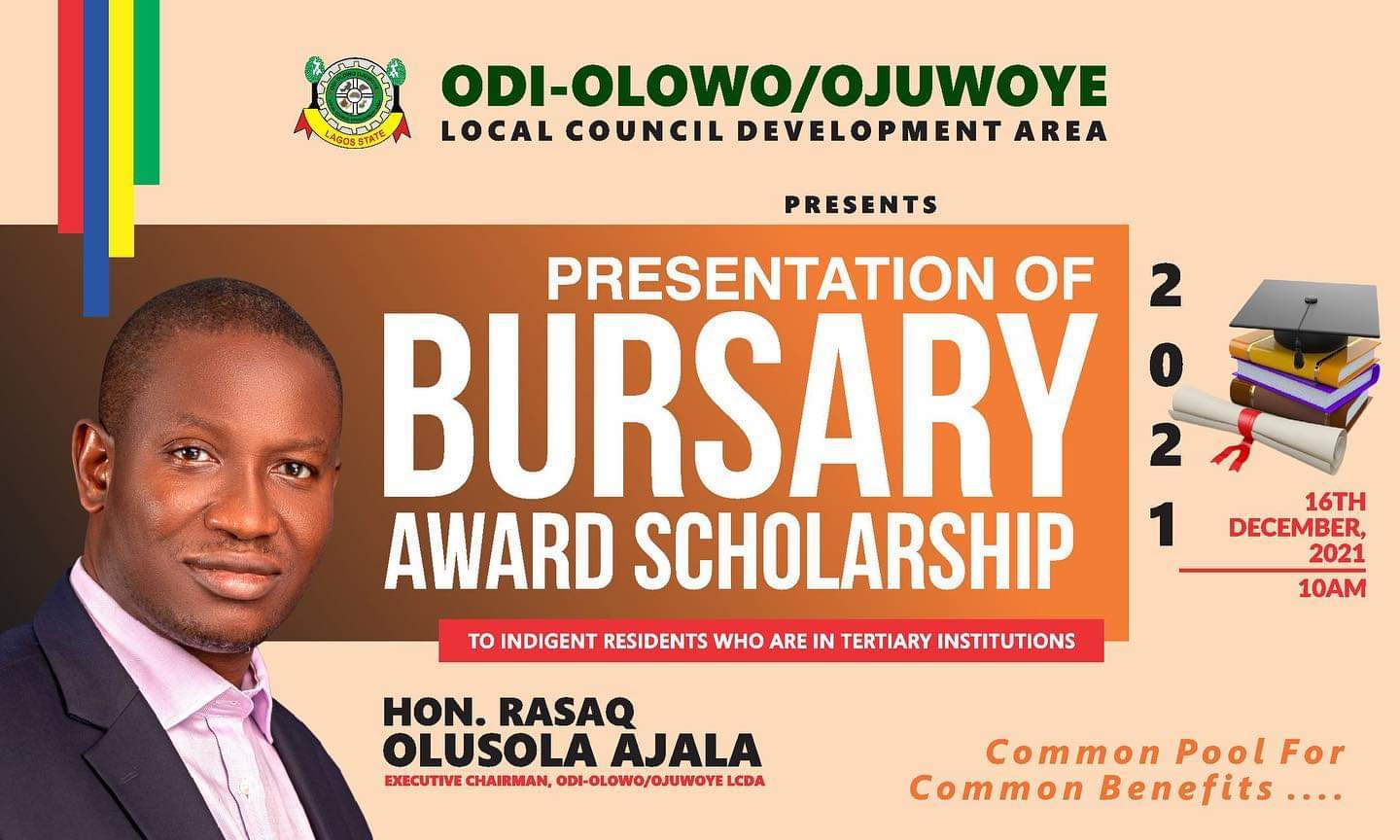
In the contemporary Nigerian society, not only are the needs and expectations of people at the grassroots are not met, there’s also a sharp disconnect between the local people and many local government administrators in terms of accessibility, policy formulation and provision of services.

However, in spite of these identified surmountable challenges, it is definitely not out of place to see some local government administrators in Nigeria who are models for their colleagues and have continued to exhibit good leadership traits and hearken to the yearnings of their people by providing dividends of democracy. One of such local government administrators whose encompassing style of grassroots governance has continually engender him to the people of his community is Hon. Rasaq Olusola Ajala, the Chairman of Odi-Olowo/Ojuwoye Local Council Development Area.
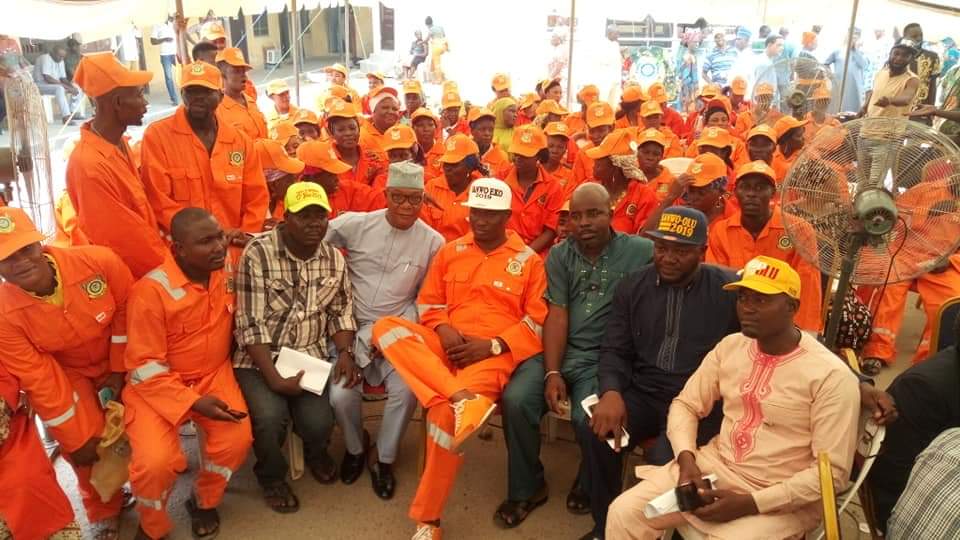
Hon. Ajala’s ascension to the exalted seat of Odi-Olowo /Ojuwoye LCDA, in Mushin area of Lagos state, has brought integrated development to the highly industrialized council. He’s currently spending his second term in office as the Chairman of the Council.
Broadly speaking, there are two functions that local governments perform. The first group of functions are those enshrined in the Fourth Schedule of the 1999 Constitution. The second group of functions are those that can aptly be described as civic and agency functions. These functions are: provision and maintenance of healthcare services, minor maintenance of state and federal roads, civic mobilization and sensitization etc.
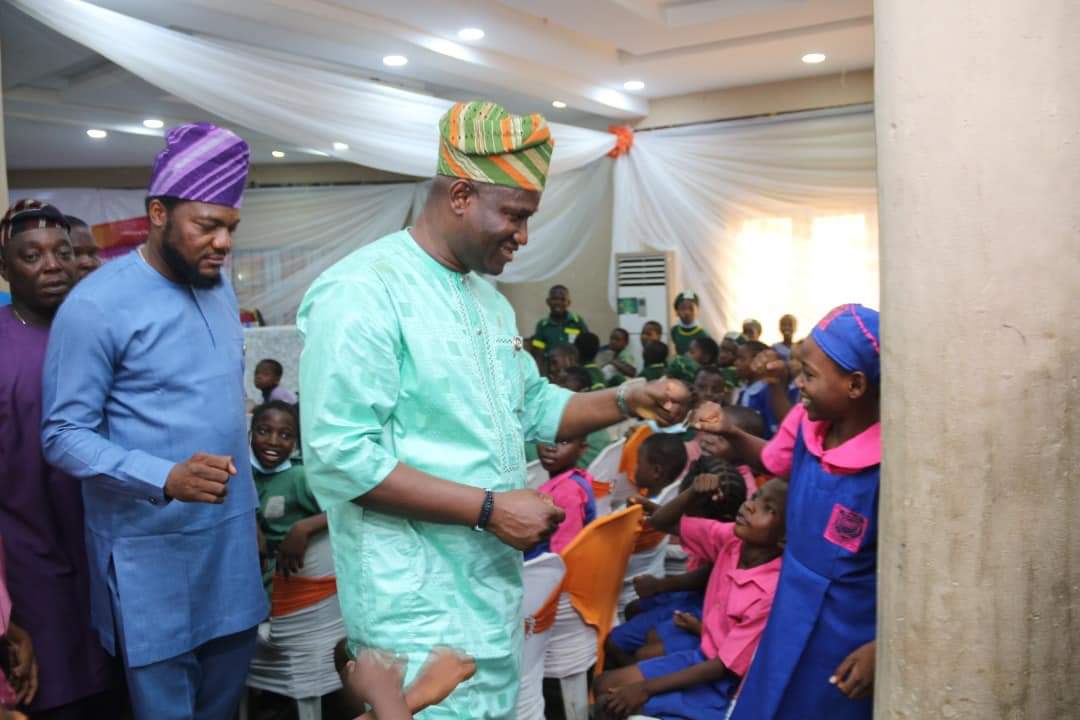
Talking about minor maintenance of State and Federal roads, if not all of them, majority of the local government chairmen do not maintain State or Federal roads in their domains, even if those roads are in deplorable conditions, and in dire need of urgent attention. Their usual excuse is that it’s not the responsibility of local governments to fix or maintain those roads because they belong to State and Federal governments. So, the blame is pushed on state or federal governments. Also, in most cases, they complained of non-availability of funds, among others.
Meanwhile, for Hon. Rasaq Ajala, it’s inconsequential whether some roads are state or federal owned. He fixes all classes of roads in his council, be it local, state or federal roads.

Giving his reason, Ajala would say; “To me, I believe that regardless of the classification of roads, majority of people plying these roads in my Council are residents of Odi-Olowo/Ojuwoye LCDA. So in our project initiation and implementation, we don’t really differentiate or feel concerned about the fact that one road is federal or state road.
The most important thing is that we fix the roads that will make people of my Council commute without stress. There are a lot of state roads that we have done and there are also federal roads that we have fixed including lots of council roads that we have rehabilitated and reconstructed. The local government roads are inner roads, anybody coming to the local government will ply the state or federal roads before accessing the local government roads. So, what’s the economic sense in fixing only the local government roads while leaving federal and state roads that are in deplorable state undone?
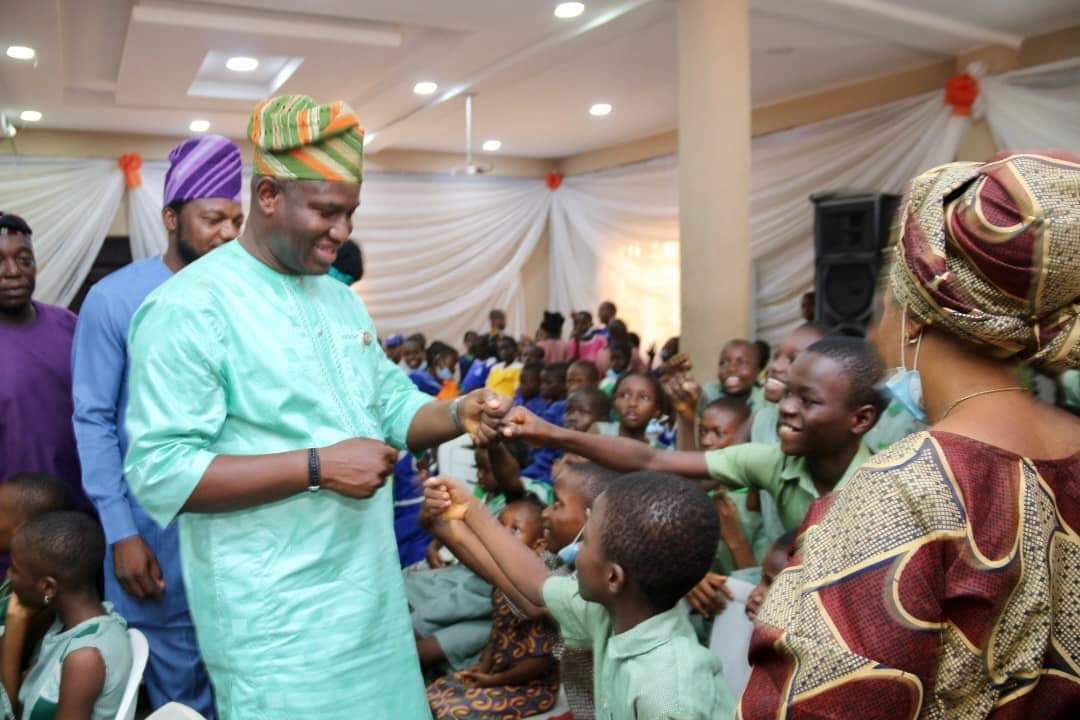
On finance, government can do little or nothing without finance. Government cannot run its day to day activities without money. Succinctly put, as blood is to human so is money the life wire of any government, especially government at the grassroots level.
The revenue allocation to local government from the federation account is worrisome and has always elicited reactions. Local council is an arm of government that should be treated as cradle of development yet it is given the lowest portion from the federal allocation. From the federation account, federal government gets the larger chunk of allocation followed by State while Local government gets the least. Federal government gets 48.50%, State government 24.00% and Local government gets 20:00%, while the remaining 7.5% are set aside as special funds.
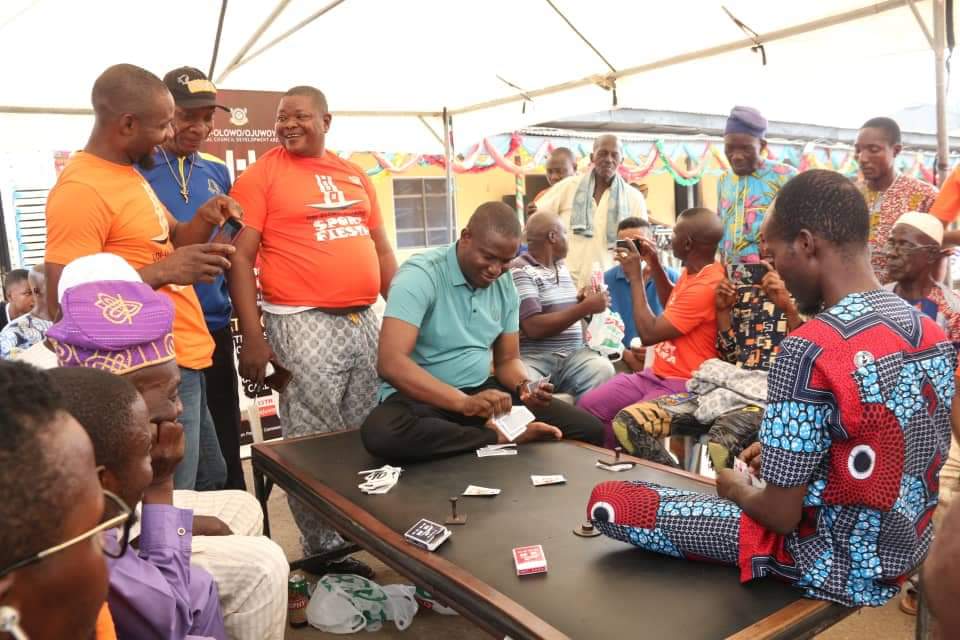
In view of the above, for any local government to carry out its constitutional functions and responsibilities to the people of the grassroots effectively and efficiently, the executive chairman of such local government must be up and doing, he must not toy with the internally generated revenue (IGR) of such local government.
Since Hon. Ajala assumed office, Odi-Olowo/Ojuwoye LCDA’s IGR has been on a steady rise year in, year out. Although, at the initial stage, he faced challenges in revenue generation as what the council was getting in terms of IGR does not commensurate with the economic architecture of the council. Hon. Ajala then swung into action. He re-engineered, restructured and came up with a workable template that brought about the desired results in revenue generation.
“What we’re getting from federal government is not sustainable, given the enormity of the responsibilities we’re expected to meet. An average people in our domain do not care how you are going to do it, they expect us to perform. And in order to meet their needs, we ensured that our internally generated revenue is shored up while we were also able to block leakages. Since we took that step, we’ve been seeing significant and steady improvement in our IGR”, Rasaq Ajala clarifies.
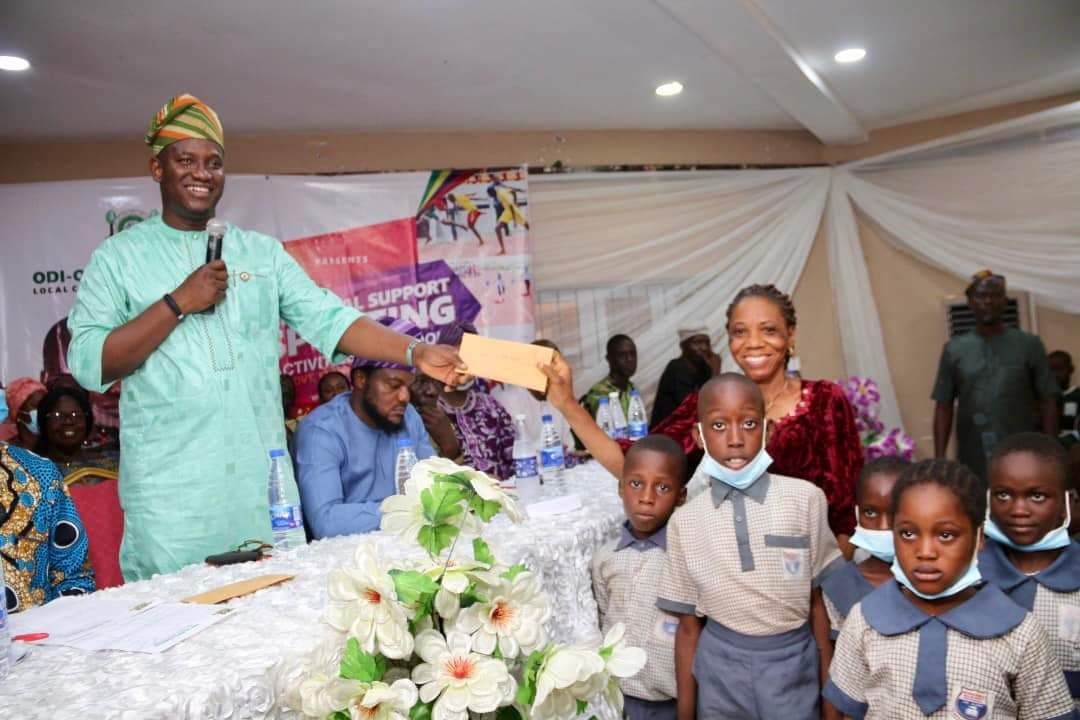
Through his four giant deals: Infrastructural Development, Social Interventions, Health and Environment Regeneration, as well as Youth Empowerment and Capacity Building, Hon. Ajala changed the narrative in grassroots governance and brought governance closer to the people of Odi-Olowo/Ojuwoye LCDA in general. Fully armed with the importance and value of money to market women, especially traders within his Council, Hon. Ajala replicated the Federal Government of Nigeria’s scheme called ‘Tradermoni’ in his Council. Yearly, he disbursed five million naira to traders in his Council to support their trade via the scheme tagged, ‘Traders Assistance Programme’(TAP).
Focusing on discovery and empowerment of youths with potentials within Odi-Olowo/Ojuwoye LCDA, Hon. Ajala came up with a yearly talent hunt programme for young individuals in six areas – Music, Dance and Stunt, Art and Craft, Catering, Essay Writing, Business, Entrepreneurial and Innovations. It was tagged ‘Odi-Olowo/Ojuwoye Talent Hunt’. It is the first of its kind in all 20 Local governments and 37 Local Council Development Areas in Lagos State. The maiden edition of the talent hunt took place this year (2021). At the end of the week long talent hunt, winners walked home with substantial cash prizes from the programme aimed at bringing their talents into reality.

Hon. Ajala made yet another mark in actively engaging the youths by charting a new course for their development by organizing the Odi-Olowo/Ojuwoye Sports Fiesta. The maiden edition of the sports fiesta took place between November and December 2021 across the nine Wards in Odi-Olowo/Ojuwoye LCDA from where participants were drawn. Sporting activities where laurels and cash prizes were competed for included, Street Soccer, Table Tennis, Boxing, Basket Ball, Draught and 52 Card Game. The idea behind the sports fiesta, according to Hon. Ajala, is not only to take the youths off the streets and discover hidden talents in sports, it’s also targeted towards correcting the impression that success is only achieved within the four walls of the classroom. Additionally, Hon. Ajala, on yearly basis, provides financial support for sporting activities in all the public primary and secondary schools within Odi-Olowo/Ojuwoye LCDA.

In a similar fashion, Hon. Ajala accorded the education sector the much needed attention it deserves. His impacts are greatly felt in this critical sector as indigent students of the Council enjoy many benefits. These include: annual presentation of Bursary Award to indigent residents of Odi-Olowo/Ojuwoye, renovation of dilapidated classrooms in all the 27 public primary schools in Odi-Olowo/Ojuwoye, construction of six blocks of classrooms at Ajenifuja and Nusaraudeen Primary schools, construction of drainages, among several others, in all the 27 public primary schools in the council, provision of free 1000 upper basic mathematics workbooks with past questions and answers for JSS3 students, annual distribution of free GCE forms and free JAMB forms for beneficiaries of the free GCE forms who passed the GCE exams with 5 credits including Mathematics and English Language. He also made life easy for parents, pupils and students in the Council with the provision of long buses to ease transportation challenges and also relieve the pressure on parents.
Health, it is often said, is wealth. Cognizant of the immeasurable importance of well-being of his people, Hon. Ajala does not pay lip service to the provision of health facilities to the admiration of all and sundry. Prominent among his programmes in health sector are: procurement of a sophisticated ambulance (Mobile Clinic) for effective health service delivery within the Council, construction of Ajisegiri Primary Healthcare Centre and upgrade of the operating hours of Coker and Ayantuga Primary Healthcare Centres to 24hours, provision of community based health insurance in partnership with the state medical mission in collaboration with Rotary Club of Ilupeju.
“Cleanliness is next to godliness”. For Hon. Ajala, keeping Odi-Olowo/Ojuwoye clean at all times is sacrosanct and non-negotiable, hence he deemed it necessary to employ and engage 100 young men and women as sanitation corps for regular cleaning up in the community, sensitization of residents and regular clearing of drains in the Council. No doubt, the employment of these people has not only ensured a clean environment in Odi-Olowo/Ojuwoye, it also has reduced the unemployment rate in the Council. To make the jobs of these sanitation corps easier, the Chairman also procured two refuse disposal trucks for them for effective waste management.
Other key areas that Hon. Ajala incomparably has made significant impacts include: annual subsidized sales of rams, chickens, turkeys during Muslims and Christians festive periods; rehabilitation and reconstruction of 146 boreholes with provision of power generating sets; refurbishment of pick-up van for Ilupeju Police station, construction and furnishing of police post; periodic financial assistance to the Council staff and payment of bonus to them during festive periods; facelift of the Council’s structures to enhance the effectiveness and efficiency of staff in delivering their statutory duties to residents of the Council.

Loved and adored by his people for his accessibility and humility, Hon. Ajala’s human relations is top notch and highly commendable and worth emulating by other local government chairmen. He is by every standard a good man, certainly not in the class of the bunch of liars, who currently dominate the turf.
Without exaggerating, Hon. Rasaq Olusola Ajala has given the residents of Odi-Olowo/Ojuwoye LCDA a new lease of life, providing them with dividends of democracy and adding value to their lives with commitment and sense of inclusiveness. His leadership disposition was in tandem with one of the popular sayings of John C Maxwell; “The bottom line in leadership isn’t how far we advance ourselves but how far we advance others, and that is achieved by serving others and adding value to their lives.”
Tunde Ogunmola is the Publisher/Editor-in-Chief of Naija News Direct (www.naijanewsdirect.com).

